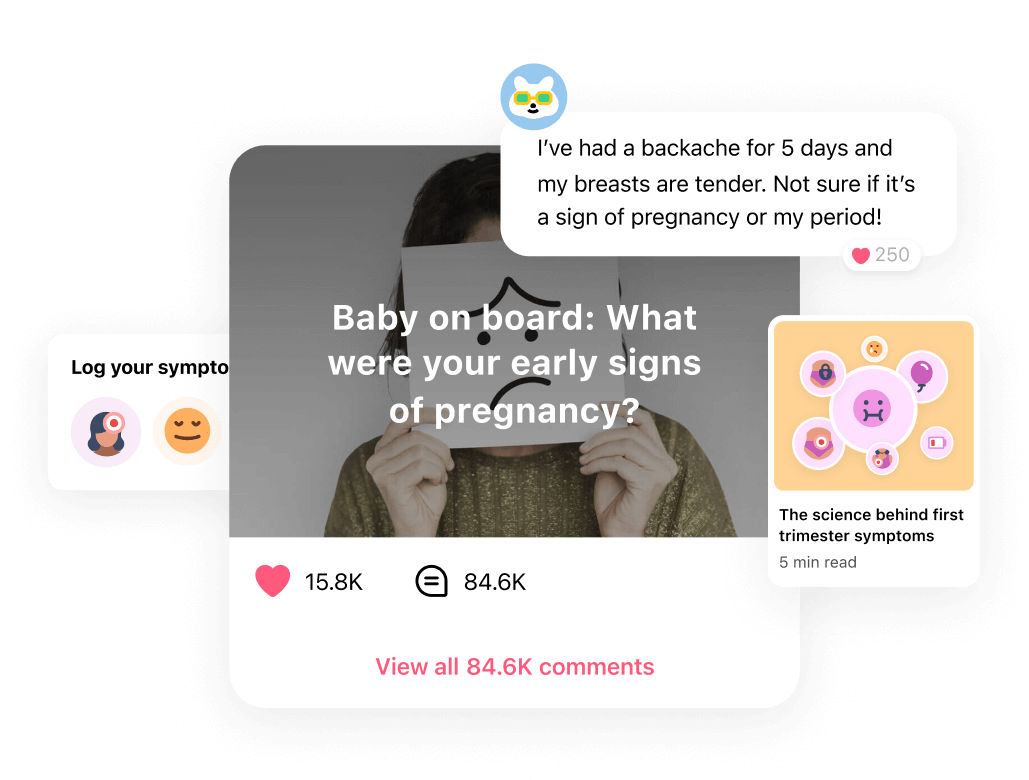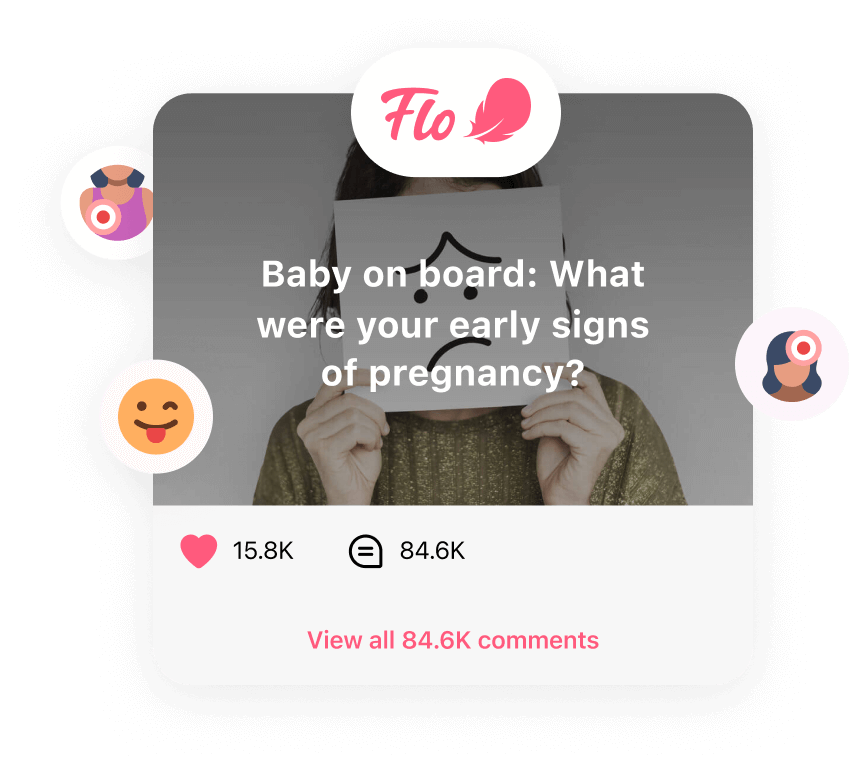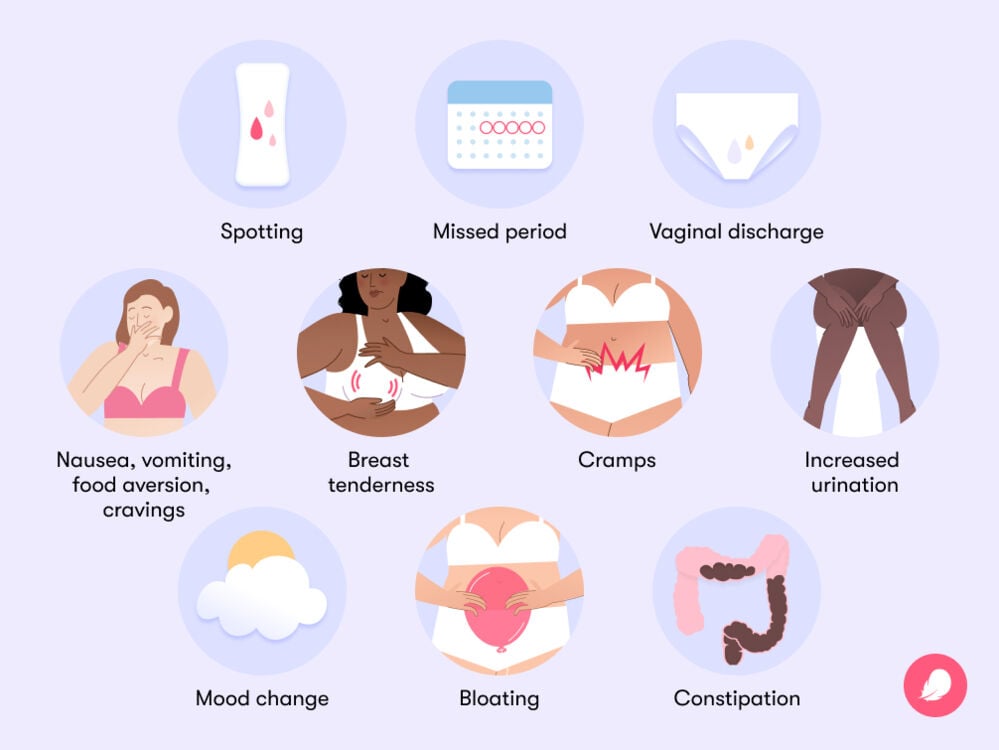It can be harder to know when you’ve missed your period if you have an irregular cycle, but there are plenty of telltale signs of pregnancy that don't require the help of a pregnancy test to help you determine whether it's finally time to take one.
-
Tracking cycle
-
Getting pregnant
-
Pregnancy
-
Help Center
-
Flo for Partners
-
Anonymous Mode
-
Flo app reviews
-
Flo Premium New
-
Secret Chats New
-
Symptom Checker New
-
Your cycle
-
Health 360°
-
Getting pregnant
-
Pregnancy
-
Being a mom
-
LGBTQ+
-
Quizzes
-
Ovulation calculator
-
hCG calculator
-
Pregnancy test calculator
-
Menstrual cycle calculator
-
Period calculator
-
Implantation calculator
-
Pregnancy weeks to months calculator
-
Pregnancy due date calculator
-
IVF and FET due date calculator
-
Due date calculator by ultrasound
-
Medical Affairs
-
Science & Research
-
Pass It On Project New
-
Privacy Portal
-
Press Center
-
Flo Accuracy
-
Careers
-
Contact Us
Signs of pregnancy when you have irregular periods: What should you look out for?


Every piece of content at Flo Health adheres to the highest editorial standards for language, style, and medical accuracy. To learn what we do to deliver the best health and lifestyle insights to you, check out our content review principles.
We all know that a missed period is one of the classic signs of pregnancy. But if you have irregular periods, it can be more than just a little confusing to figure out whether you’ve actually missed your period or if it’s just going to turn up late to the party.
If you’re anxiously waiting to take a pregnancy test, then rest assured — there are plenty of other signs and signals that could be your body’s way of telling you that you’re pregnant. In fact, there are numerous common early signs of pregnancy to look out for, and a missed period is just one of them. So while having irregular periods might make this one difficult to spot, all of the other signs of pregnancy are exactly the same, whether or not your cycles are irregular.
With this in mind, we’ve dug through the research and spoken to Dr. Charlsie Celestine, obstetrician and gynecologist, New Jersey, US, to learn more about the most common signs you can use to spot pregnancy when you have irregular periods. Read on for everything you need to know.

 Over
7.8M
ratings averaging
4.8/5
*
Over
7.8M
ratings averaging
4.8/5
*
Understand your body’s signals with the Flo app
- Chat with others who are trying to get pregnant.
- Get trusted information on signs of pregnancy from 100+ medical experts.
- Log your symptoms and learn what they could be trying to tell you.
 Over
7.8M
ratings averaging
4.8/5
*
Over
7.8M
ratings averaging
4.8/5
*

Trying to conceive?
The Flo app can help you through the two-week wait.

 Over
7.8M
ratings averaging
4.8/5
*
Over
7.8M
ratings averaging
4.8/5
*
Understand your body’s signals with the Flo app
- Chat with others who are trying to get pregnant.
- Get trusted information on signs of pregnancy from 100+ medical experts.
- Log your symptoms and learn what they could be trying to tell you.
What makes a period irregular?
Before we dive into those telltale signs of pregnancy, let’s have a quick refresher on what makes a period irregular. To do this, it’s helpful to remind ourselves of what a period actually is.
A period is part of your menstrual cycle, which runs from the first day of one period to the first day of the next period. The menstrual cycle refers to the changes that take place in your body as it prepares for a possible pregnancy. This includes ovulation, which happens roughly midway through the cycle and is when one of your ovaries releases an egg, ready to be fertilized by a sperm. After the egg is released, hormonal changes cause the lining of the uterus to thicken, ready for the implantation of a potential embryo. If the egg isn’t fertilized, then the lining of the uterus will shed and is released through your vagina as your period.
Take a quiz
Find out what you can do with our Health Assistant
The average cycle length is 28 days, but a normal menstrual cycle could range from 21 to 35 days in length. If your cycle length is continually less or more than this, meaning your periods arrive less than 21 days or more than 35 days apart, then your periods are considered irregular. Equally, if you find that you miss three or more periods in a row or that your period is much lighter or heavier than your usual flow, then your periods could also be considered irregular.
This might sound alarming, but it’s important to note that our periods will fluctuate throughout our lives, and irregular periods aren’t always a sign that something’s wrong. They’re also pretty common. Research shows that anywhere between 14% and 25% of women have irregular periods. Remember to always reach out to your doctor if you have any concerns.
Does having irregular periods affect your ability to conceive or the health of a future pregnancy?
It makes sense that if your periods are irregular, then the timing of your ovulation will be, too. And as we know, ovulation is key to getting pregnant. “Irregular periods mean irregular ovulation or sometimes no ovulation at all,” explains Dr. Celestine. “Ovulation is what is needed to conceive, so without accurate timing, conception can be more difficult.”
People with regular periods are able to use the dates of their menstrual cycle to predict when they might be ovulating and therefore figure out their fertile window (around six days in a cycle when they are most likely to conceive). Don’t forget, you can use an app like Flo to help you track all of this information. Having irregular periods might make knowing this more difficult, but don’t lose hope. Pregnancy is still absolutely possible with irregular periods. If you have any questions or concerns, be sure to speak to your doctor for advice.
Common signs of pregnancy when you have irregular periods
As we know, having irregular periods can make it tricky to spot when one has been missed. However, when it comes to signs of pregnancy, this is the only difference between having irregular periods and regular periods. “Once the pregnancy is established, the symptoms are the same,” confirms Dr. Celestine. So, let’s take a look at what those symptoms are (but keep in mind that everyone is different, so you may experience all, some, or none of the below!).
Breast tenderness
Breast tenderness can be one of the first signs of pregnancy, as it can occur as early as a few days to one to two weeks after conception. This means you could experience this telltale sign before you’d even expect to notice a missed period.
Breast tenderness or pain during pregnancy is due to the shift in hormones that occurs during this time. Dr. Celestine notes that it can be “caused by an increase in both estrogen and progesterone in pregnancy.” While one study found that 76.2% of pregnant women experienced breast pain or tenderness in the first trimester, Dr. Celestine adds that “it’s different for everyone, and some people don’t get it all.”
Spotting
Spotting is another early symptom of pregnancy that could potentially occur before you’d expect a missed period, but what exactly is it? Essentially, spotting is very light bleeding that happens at a different time from your normal period. If you’re pregnant, you could experience spotting due to implantation bleeding just 10 to 14 days after conception. While this might sound a bit frightening, rest assured that it is completely normal and simply the result of the embryo burrowing into the wall of the uterus to make a cozy home for itself.
Implantation bleeding should last for around one to two days, and the spotting will be very light (meaning you shouldn’t need anything more than a panty liner for the flow). However, bleeding that lasts longer or is heavier than this could be due to an ectopic pregnancy or a miscarriage. It’s natural to feel worried about these risks, so always reach out to your doctor if you have any concerns.
While any kind of bleeding during pregnancy can be alarming, try to keep in mind that it’s pretty common throughout the first trimester of a pregnancy. Research suggests that around 25% of pregnant women experience bleeding in the first 12 weeks of pregnancy.
As Dr. Celestine reminds us, “A lot of times, pink, brown, or red spotting can still be a normal pregnancy.”
Cramps
Cramping can also be an early indication of pregnancy. Like with mild spotting, Dr. Celestine advises that you keep an eye on any cramping you notice as your pregnancy goes on. “If it’s severe pain and heavy bleeding, then we need to look into it as soon as possible because it could be a miscarriage,” Dr. Celestine says. Cramping could also be a sign of an ectopic pregnancy, but remember that it’s important to consider how intense the cramping is. Mild cramping is generally nothing to worry about, and it can be caused by many things, including gas and constipation. So try to stay calm and monitor your body before jumping to any conclusions.

Food cravings and aversions
Do you suddenly have an insatiable craving for pickles, when you’ve always hated them in the past? Or does the thought of eating your favorite breakfast suddenly turn your stomach for no apparent reason? Food cravings and aversions can be telltale signs of pregnancy, so if you find your tastes have changed somewhat, then this could be the reason.
These symptoms could crop up around three weeks after conception, and they’re likely nothing to worry about. Around 61% of pregnant women experience cravings, and over half (54%) of pregnant women experience food aversions, so you’re certainly in good company if you find the content of your weekly grocery shopping dramatically changes. Fancy finding out whether anyone else shares your sudden desire for the spiciest food available? You can read everything you need to know about the nine most common pregnancy food cravings here.
Nausea and vomiting
How many movies have you seen where someone becomes suddenly and unexpectedly nauseous, only to realize that they’re actually pregnant? Probably quite a few! That’s because nausea and vomiting are also classic (and often unwelcome) signs of pregnancy. In fact, research has shown that 87.8% of pregnant women experience these symptoms, so if you find yourself rushing to the bathroom during your pregnancy, you can take some comfort in knowing that you’re not alone.
However, while some people experience both nausea and vomiting together, you might only experience one (or neither if you’re lucky). “Some people only feel nauseous, and some people vomit constantly,” says Dr. Celestine. And when can you expect these symptoms to occur, if they do at all? Generally, experts say that they’ll peak around nine weeks.
Vaginal discharge
You might notice a change to your vaginal discharge during pregnancy. Some pregnant women experience an increase in discharge, and the characteristics of the discharge itself could also change. Dr. Celestine adds that “increased estrogen causes a white milky discharge,” so if you’re finding this in your underwear, it might just be time to take a pregnancy test.
Mood change
Let’s be honest — sometimes our moods can change as quickly as the weather, especially when hormones are involved. And with pregnancy bringing a number of hormonal changes to your body, you may find yourself experiencing mood swings as early as three weeks after conception.
But what kind of mood changes could you expect? “Some people feel more irritable,” advises Dr. Celestine. Remember that if you do find yourself feeling anxious or depressed, you’re far from the only one. In fact, these are the most common mental health concerns during pregnancy, with approximately 12% of women experiencing depression and 13% experiencing anxiety. It’s completely understandable if you feel overwhelmed by this shift in your mood, so if you need support, always reach out to loved ones or your doctor.
Fatigue
It’s no surprise to learn that fatigue could be a symptom of pregnancy. After all, your body is working extra hard to create a whole new person. Some people might find themselves feeling extra tired around a week after conception, while this fatigue could take longer to kick in for others. “After seven or eight weeks, people usually start to feel more tired,” Dr. Celestine explains.
Increased urination
Hands up if you find yourself heading to the bathroom more frequently than usual. If this sounds familiar, then you could be experiencing yet another early sign of pregnancy. So what’s behind this increased need to pee? Essentially, scientists reckon it’s related to the fact that pregnancy means increased blood levels. This can lead to an elevated amount of urine needing to leave your body because your blood is filtered by your kidneys.
You could experience this symptom as early as three weeks after conception, but Dr. Celestine adds that it’s generally more noticeable later on, in the third trimester. This is because of “pressure on the bladder from the uterus, due to having a larger uterus and baby.” Makes sense!
Bloating
Most of us have experienced the familiar feeling of bloating before, and it can be caused by a number of things. After all, who hasn’t felt bloated after eating a big meal a little too quickly? With this in mind, it can be tricky to spot when bloating is a symptom of pregnancy. Scientists reckon that it happens due to a rise in progesterone, and you could experience it around a week after ovulation.
Constipation
That rise in progesterone during pregnancy could also cause you to become constipated. If you find yourself spending more time in the bathroom than normal, then you’re not the only one. One study found that anywhere between 11% and 38% of pregnant people experience constipation in their pregnancy. Usually, this happens around the third trimester, but it could kick in as early as three weeks after conception.
When should you take a pregnancy test if you have irregular periods?
“Those with irregular periods should always take a pregnancy test if they skip a period,” advises Dr. Celestine. Of course, if you don’t have a regular menstrual cycle, it can be tricky to know when exactly you have missed your period.
Luckily, there’s a solution to this problem, and it involves a bit of math. Experts recommend counting 36 days from the start of your last menstrual cycle (i.e., the first day of your last period) and taking a test on this day (or later, if you’ve passed it). By this point, if you are pregnant, it should show up on a test. (And don’t forget that you can track your periods using an app like Flo to help you figure out when your last period was.)
While there’s no denying that the wait to take a pregnancy test can feel impossibly long (whether you’re hoping for a positive result or a negative one), it’s best not to rush it and risk getting an incorrect result. In fact, if you do think you know when you’ve missed a period, experts advise that you wait to take a test until the following day for more accurate results.
When it’s time to take a test, Dr. Celestine recommends trying it first thing in the morning. “The urine pregnancy test needs a certain amount of the pregnancy hormone in order to register as positive,” she explains. This hormone, which only develops during pregnancy, is called human chorionic gonadotropin (hCG). It starts to build up approximately 10 days after fertilization.
As hCG comes out of the body in your urine, “the first pee in the morning usually has the highest concentration of that pregnancy hormone because it builds up in your system all night,” explains Dr. Celestine. She adds that later in the day, when you’ve been eating, drinking, and peeing, your urine may be diluted, which could give you less accurate results.
When should you contact a doctor?
If your pregnancy test shows up as positive, then it’s a good idea to give your doctor a call so they can book you in for an appointment to discuss your prenatal care. This important first visit will usually take place when you’re between six and 12 weeks pregnant, although your doctor might see you earlier or later, depending on your health history and needs.
If your pregnancy test shows up as negative, but you think you’ve missed a period, Dr. Celestine advises that you try to wait a week before taking another one. If it’s still negative, and you still haven’t had a period, it might be a good idea to check in with your doctor to make sure everything is OK. “That’s as long as you’re feeling fine,” adds Dr. Celestine. Remember that you should always see a doctor sooner if you’re in severe pain or have any concerns.
It’s completely natural to feel disheartened if you’d been hoping for a positive pregnancy test, but try to remain optimistic. Remember that around 85% of couples will conceive within their first year of trying, so it’s a good idea to try to focus on your next cycle. Your doctor can also help you look at various fertility treatments further down the line if necessary. “People under 35 years old should see their doctor if they are trying to conceive and not getting a positive pregnancy test after one year of trying, and after six months of trying over 35 years old,” adds Dr. Celestine.
If you find yourself feeling relieved by a negative result, then it might just be time to rethink your regular contraceptive method.
Signs of pregnancy when you have irregular periods: The takeaway
There’s no denying that having irregular periods can make it more difficult to spot when you miss a period. But when it comes to the signs of pregnancy when you have irregular periods, that’s the only difference you need to keep in mind.
As Dr. Celestine says, people with irregular periods will “experience the same symptoms once pregnant” as people with regular periods. And since there are many other common signs and symptoms of pregnancy to look out for, listening to your body and tuning in to any changes could help you determine whether you need to take a pregnancy test or not.


Hey, I'm Anique
I started using Flo app to track my period and ovulation because we wanted to have a baby.


The Flo app helped me learn about my body and spot ovulation signs during our conception journey.


I vividly
remember the day
that we switched
Flo into
Pregnancy Mode — it was
such a special
moment.
Real stories, real results
Learn how the Flo app became an amazing cheerleader for us on our conception journey.
References
“Am I Pregnant?” Cleveland Clinic, my.clevelandclinic.org/health/articles/9709-pregnancy-am-i-pregnant. Accessed 16 Feb. 2023.
Bayley, Tracy M., et al. “Food Cravings and Aversions during Pregnancy: Relationships with Nausea and Vomiting.” Appetite, vol. 38, no. 1, Feb. 2002, pp. 45–51.
“Ectopic Pregnancy.” Mayo Clinic, 12 Mar. 2022, www.mayoclinic.org/diseases-conditions/ectopic-pregnancy/symptoms-causes/syc-20372088.
“Fetal Pole.” Cleveland Clinic, my.clevelandclinic.org/health/body/22546-fetal-pole. Accessed 16 Feb. 2023.
Hasan, Reem, et al. “Patterns and Predictors of Vaginal Bleeding in the First Trimester of Pregnancy.” Annals of Epidemiology, vol. 20, no. 7, July 2010, pp. 524–31.
“Pregnancy FAQs.” NHS, www.nhs.uk/start4life/pregnancy/pregnancy-faqs/. Accessed 16 Feb. 2023.
Hendriks, Erin, et al. “First Trimester Bleeding: Evaluation and Management.” American Family Physician, vol. 99, no. 3, Feb. 2019, pp. 166–74.
“Home Pregnancy Tests: Can You Trust the Results?” Mayo Clinic, 23 Dec. 2022, www.mayoclinic.org/healthy-lifestyle/getting-pregnant/in-depth/home-pregnancy-tests/art-20047940.
“How to Get Pregnant.” Mayo Clinic, 11 Dec. 2021, www.mayoclinic.org/healthy-lifestyle/getting-pregnant/in-depth/how-to-get-pregnant/art-20047611.
“Is Implantation Bleeding Common in Early Pregnancy?” Mayo Clinic, 19 Apr. 2022, www.mayoclinic.org/healthy-lifestyle/pregnancy-week-by-week/expert-answers/implantation-bleeding/faq-20058257.
“Irregular Periods.” Cleveland Clinic, my.clevelandclinic.org/health/diseases/14633-abnormal-menstruation-periods. Accessed 16 Feb. 2023.
Jukic, Anne Marie Z., et al. “Analgesic Use at Ovulation and Implantation and Human Fertility.” American Journal of Obstetrics and Gynecology, vol. 222, no. 5, May 2020, pp. 476.e1–11.
“Menstrual Cycle.” Cleveland Clinic, my.clevelandclinic.org/health/articles/10132-menstrual-cycle. Accessed 23 Feb. 2023.
“Menstrual Cycle: What’s Normal, What’s Not.” Mayo Clinic, 6 Dec. 2022, www.mayoclinic.org/healthy-lifestyle/womens-health/in-depth/menstrual-cycle/art-20047186.
“Symptoms: Miscarriage.” NHS, www.nhs.uk/conditions/miscarriage/symptoms/. Accessed 16 Feb. 2023.
“Antenatal and Postnatal Mental Health: Clinical Management and Service Guidance.” National Institute for Health and Care Excellence, 17 Dec. 2014, www.nice.org.uk/guidance/cg192.
Nazik, Evsen, and Gulsen Eryilmaz. “Incidence of Pregnancy-Related Discomforts and Management Approaches to Relieve Them among Pregnant Women.” Journal of Clinical Nursing, vol. 23, no. 11–12, June 2014, pp. 1736–50.
“Pregnancy Constipation.” Cleveland Clinic, my.clevelandclinic.org/health/diseases/21895-pregnancy-constipation. Accessed 16 Feb. 2023.
“Pregnancy Tests.” Office on Women’s Health, 22 Feb. 2021, www.womenshealth.gov/a-z-topics/pregnancy-tests.
“Pregnancy Test: When to Take, Types & Accuracy.” Cleveland Clinic, my.clevelandclinic.org/health/articles/9703-pregnancy-tests. Accessed 16 Feb. 2023.
“Session 24: Ovulation and Fecundity.” Human Reproduction, vol. 25, suppl. 1, June 2010, pp. I37–38.
Smith, Judith A. “Nausea and Vomiting of Pregnancy: Clinical Findings and Evaluation.” UpToDate, 28 Apr. 2022, www.uptodate.com/contents/nausea-and-vomiting-of-pregnancy-clinical-findings-and-evaluation.
“Signs and Symptoms of Pregnancy.” NHS, www.nhs.uk/pregnancy/trying-for-a-baby/signs-and-symptoms-of-pregnancy/. Accessed 16 Feb. 2023.
“Symptoms of Pregnancy: What Happens First.” Mayo Clinic, 3 Dec. 2021, www.mayoclinic.org/healthy-lifestyle/getting-pregnant/in-depth/symptoms-of-pregnancy/art-20043853.
“Vaginal Discharge in Pregnancy.” NHS, www.nhs.uk/pregnancy/related-conditions/common-symptoms/vaginal-discharge/. Accessed 16 Feb. 2023.
Vazquez, Juan C. “Constipation, Haemorrhoids, and Heartburn in Pregnancy.” BMJ Clinical Evidence, vol. 2010, Aug. 2010, www.ncbi.nlm.nih.gov/pubmed/21418682.
“What Are Menstrual Irregularities?” Eunice Kennedy Shriver National Institute of Child Health and Human Development, www.nichd.nih.gov/health/topics/menstruation/conditioninfo/irregularities. Accessed 16 Feb. 2023.
“What Are Some Common Signs of Pregnancy?” Eunice Kennedy Shriver National Institute of Child Health and Human Development, www.nichd.nih.gov/health/topics/pregnancy/conditioninfo/signs. Accessed 16 Feb. 2023.
History of updates
Current version (02 March 2023)
Published (02 March 2023)
In this article

Get your personal guide to fertility
-
Learn how to read your body's ovulation signals
-
Find daily conception tips from our experts
-
Chat with others who are trying to get pregnant




